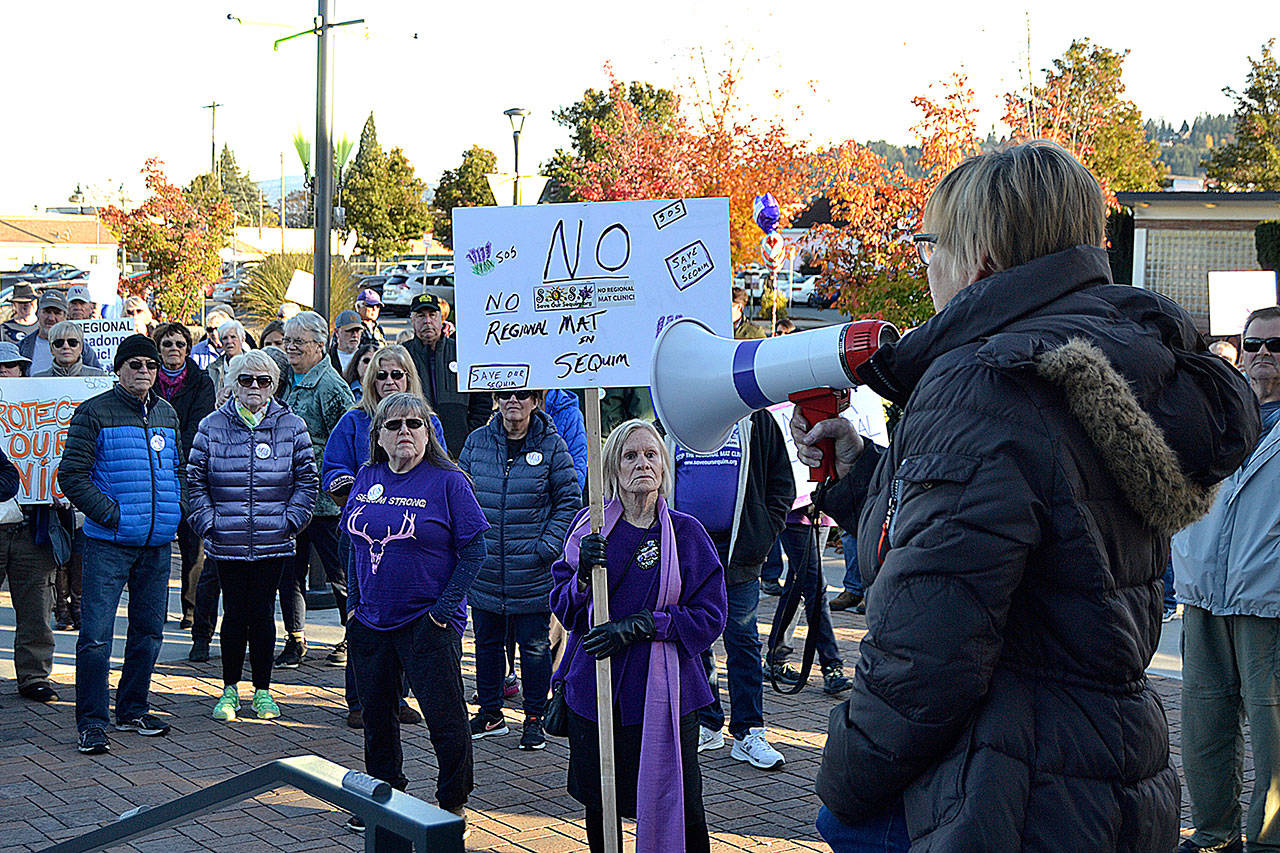The city’s process for the Jamestown S’Klallam Tribe’s proposed medication-assisted treatment (MAT) facility is about to begin.
Barry Berezowsky, Sequim’s community development director, said he’s scheduled to meet with tribe health services director Brent Simcosky on Oct. 31 for a pre-application meeting regarding the project.
“We do it for all projects,” Berezowsky said. “We ensure they have all the right pieces for the application.”
He said developers can request to waive the pre-application process, but that the tribe hasn’t done that.
If and when tribe officials turn in a completed application, Berezowsky said, is up to them.
The facility, named by the tribe as a Healing Campus, includes a two-phase MAT facility and an inpatient psychiatric evaluation and treatment facility, in a 15,000-square-foot building that could be expanded to about 25,000 square feet.
The MAT clinic would dispense daily doses of methadone, Suboxone and Vivitrol for opioid-use disorder and receive wrap-around services of primary care, counseling and more at the proposed facility at South Ninth Avenue.
Simcosky previously said the clinic would start with about 20 patients and grow to 250 patients over a few years. Those patients, he said, are self-referred only from Clallam and Jefferson counties.
He previously said MAT facility officials will “do intakes and select the right people for self-referral.”
Simcosky said, “If any problems arise, we can fix them. We’ll work out a mitigation plan with the city, (and) put tracking badges on people. We can do all kinds of things.”
For phase one, the tribe, Olympic Medical Center and Jefferson Healthcare received $7.2 million from the state’s capital budget application, and they’ll seek the remainder of the facility’s funding in the upcoming legislative session.
Simcosky said the tribe will use about $3 million of its own funds for phase one as well.
He said when the tribe purchased the land they didn’t imagine it’d be in a location people wouldn’t OK with placing the facility.
Push back
Despite attempts to diminish concerns at forums and online by the tribe, some community members remain worried of the clinic’s impacts and continue to ask Sequim city councilors to act.
Since news came out about the grant funding last June, organizers with the group Save Our Sequim have grown their online support to about 2,400 Facebook users organizing weekly meetings, letters to the editor and public comments at city meetings.
From that effort, about 200 people attended a rally Monday night, led by Save Our Sequim chairman Jodi Wilke.
Using a megaphone, she encouraged participants to vote, and reiterated their stance that Sequim can’t support a clinic of this size without issues.
“Why should we ship in a whole bunch of people who are not going to be able to be served?” Wilke asked.
She added, “we need to make this election a referendum on the current policies.”
At the city council’s public comments, Wilke told them, “We believe the process for rubber stamping the MAT by an administrative process is an inappropriate way to deal with that,” she said.
“We believe the facility itself falls within a public evaluation process that should be rigorous and complete.”
Quoting an SOS pamphlet, Wilke said the city’s Municipal Code requires multiple things for a project like the clinic, particularly “proof that Sequim needs this facility,” the “proposal fits within the growth plans for Sequim,” “does not threaten health, safety, convenience or general welfare of Sequim” and that the city council must address nuisances, availability of public services, prevent harm to neighboring properties and conforms to existing zoning requirements.
“We believe none of these will be true with the facility that’s proposed,” she said.
MAT support
The number of supporerts of the MAT facility at recent city council meetings has grown. On Monday, about a dozen people gathered by the tribe’s totem pole in the Sequim Civic Center plaza near the SOS rally singing hymns.
Karen Hogan with the new group Voices for Health and Healing, spoke during the city meeting’s public comments period, saying opioid-use disorder is a public health crisis that has afflicted the North Olympic Peninsula.
“Sequim has not been spared,” she said. “The person suffering from OUD could be the person sitting next to you in church at the table next to you in your favorite cafe.”
Hogan said the tribe’s “holistic approach to the health care crisis treats OUD clients with respect and compassion.”
“We do not believe that the planned facility poses a threat to the community of Sequim,” she said.
“Our experience with the tribe has been that they are competent, have integrity, and are a generous partner when it comes to contributing to the Sequim community.”
Additionally, Hogan said, local governments may not use zoning laws to discriminate against MAT programs.
City councilor contested
During public comments, city councilor Jennifer States was asked to recuse herself from any future votes regarding the MAT because her business Wind Rose Cellars, which she co-owns with her husband David Volmut, does business with the tribe.
In an interview, States said she consulted with the city’s attorney Kristina Nelson-Gross and she learned that she does not need to recuse herself because the state law says there is not a conflict of interest.
Volmut, who manages the business, said in an interview that the only wine he’s sold to the tribe is for a Habitat for Humanity fundraiser each summer at about two cases each year. He said whatever isn’t used at the event is sold at the tribe’s Longhouse Market & Deli.
Volmut said he’s attempted to sell his wine to the tribe other times but they haven’t purchased it.
For more information on the Jamestown S’Klallam Tribe’s proposed MAT clinic/Healing Campus, visit jamestownhealingcampus.org.
For more information on Save Our Sequim, visit www.saveoursequim.org.
Reach Matthew Nash at mnash@sequimgazette.com.



